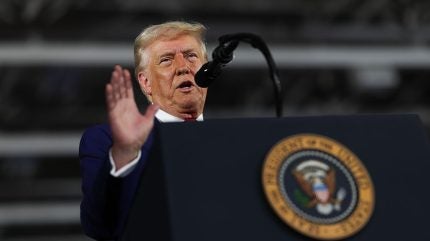
Pharma companies are looking to shore up manufacturing operations in the US to counter international tariffs, but are also bracing for the impact of cuts to the regulatory and research organisation, as US President Donald Trump completed 100 days in office.
In his address to a rally marking his 100 days, Trump said, “We will always protect Medicare and Social Security for our great seniors, with no cuts, and we will defend Medicaid for those great people that are in need.” While the address largely focused on his immigration and international relations policy, announcements made earlier in the day touted major deal wins related to the healthcare space.

Discover B2B Marketing That Performs
Combine business intelligence and editorial excellence to reach engaged professionals across 36 leading media platforms.
Chief among the list of investments highlighted by Trump’s office on 29 April, were several onshoring plans announced by healthcare companies, like MSD and Thermo Fisher. In recent months, a trickle of investment announcements has come through from multinational pharma companies for building or expanding manufacturing operations in the US. Since March, J&J announced a $55bn investment, Roche said it is spending $50bn for developing drugs and diagnostics, while Novartis pledged $23bn for its US manufacturing operations. Other major companies like Eli Lilly and Regeneron have also made news with their big-ticket investments into US manufacturing.
Earlier this week, Amgen announced a $900m expansion in its Ohio manufacturing facility, which got the spotlight from the President’s office, particularly as the company cited the previous Trump administration’s 2017 Tax Cuts and Jobs Act as a factor driving these growth plans.
However, more onshoring efforts, amidst increasingly tense relations with China—a major supplier of active pharmaceutical ingredients (APIs)—could result in potentially higher costs for drugs, as per GlobalData’s Pharma Strategic Intelligence report on Geopolitical, Macroeconomic, & Regulatory Changes Impacting the Pharmaceutical Industry.

US Tariffs are shifting - will you react or anticipate?
Don’t let policy changes catch you off guard. Stay proactive with real-time data and expert analysis.
By GlobalDataGlobalData is the parent company of Pharmaceutical Technology.
Moreover, these investments came after a period heightened uncertainty fueled partly by speedily shifting country-specific tariffs. While the pharma sector was exempt as a whole, a downward trend in major markets like the Dow and S&P 500 affected the shares of pharma and biotech companies. Moreover, President Trump has since hinted that pharma tariffs are imminent.
Another feature noted in the GlobalData report were the job cuts announced at the Department of Health and Human Services (HHS) during the first 100 days. With over 3,500 workers laid off at the US Food and Drug Administration (FDA), a delay in drug approvals is expected, and if they were to persist, there is a concern that pharma companies may “choose to break into other markets first or to focus their drug development outside the US,” the report says.
Additionally, President Trump issued a record 142 executive orders during his first 100 days, one of which targeted a controversial part of the Inflation Reduction Act (IRA). The IRA gave biologics an advantage by giving biologics a longer period to remain exempt from price negotiations for Medicare coverage, compared to small molecules, prompting critics to call this a ‘pill penalty’. The executive order targeted this aspect and called on HHS Secretary Robert F. Kennedy Jr to guide reform on the Medicare Drug Price Negotiation Program.
On the regulatory front, National Biotechnology Initiative Act of 2025, introduced in the Senate, has the potential to “revitalize the biotech industry and harmonise federal initiatives on biotechs,” but would first need to pass both the House and Senate.
Navigate the shifting tariff landscape with real-time data and market-leading analysis.
Request a free demo for GlobalData’s Strategic Intelligence here.




